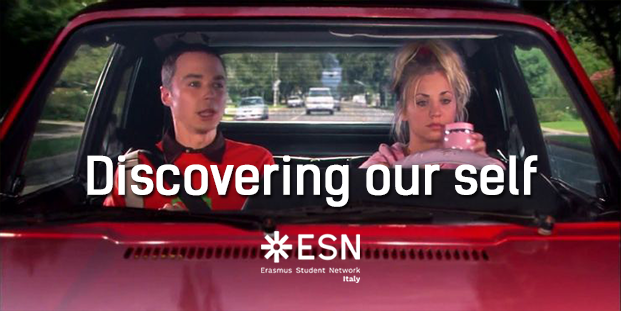
How many times have we read and heard the Latin phrase “mens sana in corpore sano”? But how many times have we really pondered its real meaning? How much importance do we give to our mental well-being? How often do we tend to put it in second place to our physical health?
Today we are going to explore some aspects of mental health with the psychologist Paola Zaira Sciutto. Paola comes from Pizzo, a small town in the province of Vibo Valentia, Calabria. After completing her Master's degree in “Neuroscience and psychological rehabilitation” in Padua and an internship in Brussels at the ULB, she decided to challenge herself and bring all the experience and knowledge she had acquired during her studies back to her homeland.
Today's society confronts us with many situations and stresses that do not always have a positive effect on us. But is everything we perceive as negative really pathological? What is the limit between “normal” and “pathological”?
Our society, the western one, is often in a rush and performance-oriented. It is a society based on the “I have to do it myself”, “I have to achieve my goals” ideology. What should be normalised is the fact that you may not be able to cope on your own; this does not mean that you are weak or even crazy! Everyone can go to therapy. Citing recent research, 70% of Europeans do not go to a health professional because they think they can cope on their own. This is exactly the mirror of our society: asking for the help of a health professional, be it a psychologist or a psychotherapist, is seen as a defeat or a lack of strength, like admitting "I couldn't make it alone".
We all have setbacks in our lives, moments when we feel weaker, helpless, anxious. It is an act of love towards ourselves, when we feel this way, not to exceed our resources. In fact, being able to ask for help is a point of strength and extreme courage. Moreover, in our society, even a “change of direction” is seen as a failure. For example, I decide to do that specific university faculty and, after a while, I realise that it is not good for me and I want to change, thus "I have failed", but it is not so!
We are human beings, "the only constant is change" (cit.). It is perfectly normal to change your mind during your life. We should be more forgiving towards ourselves. How can you tell the difference between “normal” and “pathological”? It is not like “I have it/I don't have it”, but more a continuum between normal and pathological. What we might call an aut aut to understand if we are dealing with something that needs more attention is when we feel limited in our daily life, when what we feel becomes so strong that it prevents us from leaving our house, from carrying out our daily activities as we normally would, from taking an exam, from taking the car and driving, from going on a trip.
The subject of mental health, in one way or another, permeates reality, but are we really aware of its importance? Is the famous “mens sana” really recognised as having an influence on our general well-being?
Quick answer: no, mental health is not as recognised as physical health.
More articulated answer: in the last period more attention has been paid to the theme of psychological health, also because, as Order of Psychologists, we have made ourselves heard by the Government. After more than a year of pandemic, the demand has increased and perhaps it is becoming more normal to go to a psychologist. During the Covid period, a lot of importance was given to treating people from a physical point of view, i.e. finding a cure, but no priority was given to the aspects of life experience and, in particular, I am referring to people who died alone in hospitals. There was no adequate care on the process towards death, no attention was put into making it possible for people to go to the bedside of a family member that was about to die. Some progress has been made, but there is still a long way to go.
One of the moods we face most frequently is anxiety, whether it is about the uncertain future, the next day’s exam or perhaps a message we are waiting to receive. But is anxiety just an enemy to be fought or can it help us in some way?
These examples have something in common: the future. Anxiety is defined as a state of worry about something that is likely to happen in the future and is perceived as a threat. It is something that predisposes us to respond to that event. When we are anxious, in addition to the feeling, there is a series of physiological activations that take place in our body: sweating, trembling of hands and voice, blood going to the muscles, increased heart rate. This is all because in nature, during our evolution as human beings, we have phylogenetically developed anxiety: it has saved us from dangers, putting us into action when facing a threat.
There are typically two responses: attacking or escaping. Whether you decide to attack or escape, that physiological activation is preparing you for the response. It is true that this is how we have evolved, but it is also true that nowadays we no longer find cheetahs or lions on the streets to defend ourselves against. The fact is that your body doesn't know this and reacts in the same way to an exam you have to take the next day.
Anxiety comes from us, and like everything that comes from us, it cannot be wrong. If my body is reacting like this, it may be telling me something. The most common mistake people make is trying to avoid anxiety; we should learn to listen to it instead and understand what it is trying to tell us. Some time ago I was listening to a podcast called "Like boats in the middle of the sea", which described this typical feeling in young people between 18 and 30. On this podcast, they talk about an episode of "The Big Bang Theory", where Penny and Sheldon are in the car together and there's a check engine light on. Sheldon says to Penny, "Look, the check engine light is on, you should check it", and she answers, "Just don't look at it". Anxiety is a bit like this light, it taps us on the shoulder and says, "Look, there's something you're ignoring in every way, but maybe you should pay attention".
Here again, there is a line between “normal” and “pathological”. When we enter the pathological, anxiety prevents us from carrying out our daily activities autonomously. If, on the other hand, I am anxious because I am preparing for an exam but in the end, whatever the outcome, I am going to face it, then it is proper anxiety that is preparing me to respond to that event. Listening to our anxiety would be the right thing to do.
Covid-19 has undoubtedly had an impact on our lives and our mental health. The pandemic has challenged both the future and freedoms we used to take for granted and untouchable, such as the freedom to travel and move around without restrictions. This has certainly been felt most strongly by young people, but what has actually been the effect on them? Did Covid seriously affect the mental health of individuals or did it only highlight an existing problem?
Covid was a trauma in the psychological sense of the word. The word “trauma” comes from Greek and means “wound”, so like any wound it has a before and an after. We now think in terms of pre- and post-Covid. Every traumatic event, every wound widens a pre-existing gap. As numerous studies show, young people today suffer more from anxiety and depression than previous generations.
Let me read you a story that I really liked: "In Central America, a group of Indians was transporting material on a forced march for an archaeological expedition. On the fifth day, they suddenly decided to stop and neither rewards nor threats convinced them to keep going. After three days they took off again, to the amazement of the scientists, and when trust was established some time later, they simply explained: «We were running too fast, so we had to wait for our souls to catch up with us». Are we sure that our souls don't have a long way to go to catch up with us too”. We had to stop forcibly. In a society that, as we said at the beginning, is all about achieving things, are we sure that this has been a bad thing? Or has it allowed us to get in touch with our deepest selves and to know ourselves better? There have been restrictions on our freedoms and this has had consequences, but it is perfectly normal to feel worried about the future, these are emotions that are right to feel at this time. I think of a parent who has children to support and maybe doesn't know if they can go back to work, I think of us young people who don't know if we will have a job or not. But I would like to find the other side of the coin and try to see the glass half full, which does not mean being always positive and smiling; that would be an act. It means accepting, because in life there will always be things that are beyond our control. Acceptance does not mean resignation: it means observing from the outside, taking note and simply moving on. This is one of the first principles of mindfulness.
Is it possible to act on one's mind in order to benefit physically? Which advice can be useful for coping with today?
Mindfulness can be a great help, I say this because I have experienced it first hand.
It helps us to act on our body too. If we act on our emotions, we will inevitably act on our body too, as they are extremely connected. One could not live without the other. The definition of mindfulness is to consciously pay attention to the present moment in a non-judgmental way and this relates very much to the acceptance I mentioned earlier: it helps us to be in the present. When we have a very uncertain future ahead of us, what we can do is trying to be in the here and now. If a discomfort arises and it becomes limiting, we should not hesitate to turn to any professional. Almost every psychologist and psychotherapist is now working online as well. Being with one's emotions, being more forgiving and flexible towards oneself certainly has benefits. We need to listen to ourselves more. Listening is not just about words, but attention, care and presence.
The Health & Well-being Team

Follow us